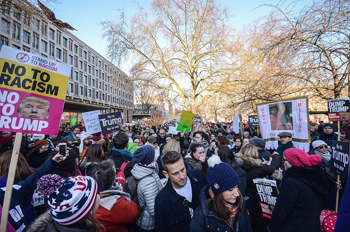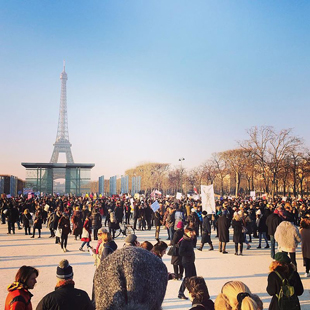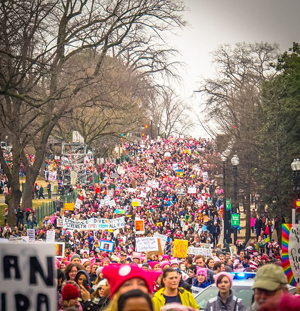Brie Linkenhoker is the director of Worldview Stanford, a project at Stanford University that creates media and learning experiences for public audiences. She is a member of St. Mark's Episcopal Church in Palo Alto, CA.
Marching isn’t really my thing. I’m a cerebral protester, someone who reads and thinks, and reads some more, and seeks out perspectives to challenge my own. I steep myself in words and ideas. I try to extend empathy and understanding as far as I can. When my own emotions run high, I wait for calmer moments to test my conclusions for bias and rationality. And when I reach a strong position, I refine my internal arguments to guide my voting choices, letters to Congressional representatives, decisions about which social change organizations to support, and comments in the occasional Facebook skirmish.
 |
|
Women's March 2017, London.
|
What an incredibly privileged way to live.
This isn’t to say that I hadn’t been moved in the past to turn up for the occasional protest against war, violence perpetrated against black men, socioeconomic inequality, or our failure to act on climate change. But for most of my life, my sadness and anger at the injustices around me remained a lived experience for just one person: me. And I could afford that — because of the color of my skin, the place of my birth, my education, religion, access to health care, and marriage to a member of the opposite sex.
But this presidential election pushed that sense of injustice out of my head. My anger in November was embodied as it had never been before. We had just elected to the highest office in the land a man who feels it is his right and privilege to grab a woman’s body — without her consent — for his own enjoyment. A man who freely expresses his disgust with women’s bodies when faced with their potential to grow and nourish another human being. This combination of presumed power, disrespect, and disgust are exactly what give rise to rape as a weapon against individual women and entire races of people. And nearly 63 million Americans thought they could live with those attitudes in our White House just fine.
That is why I decided to march. Two weeks after the election, a visceral anger still knotted this female body that I inhabit. When I heard about the Women’s March on Washington, buying a plane ticket was an easy decision. I would march to assert the value and sanctity of the female body. I’d be accompanied by twenty plus women from my church, stay with my sister in the DC area, and join what I hoped would be hundreds of thousands of other women, with experiences both similar to and remarkably different from my own. Together we would make what social movement expert Charles Tilly called a WUNC display: a public demonstration of worthiness, unity, numbers, and commitment.
Then things got more complicated.
In my cerebral way, I dug into the online forums where emotions ran high among women discussing the mobilization to march. In some forums, fired-up women pledged our collective power to fight not just for women’s rights, but for the rights of immigrants, Muslims, the LGBTQ community, people with disabilities, and everyone else our new president mocked or threatened.
But this growing sense of “collective” power frustrated other women, who asked, “Where were you when we were fighting for the lives of our husbands, brothers, and sons, when 39 unarmed black men were killed by police in 2016 alone? Did you even know that Obama set new records for deportations of illegal immigrants? Given your concern for Muslims, did you protest the drone strikes in the last administration that investigative journalists estimate killed more than 5000 people, at least 10% of them civilians? Do you have any idea what it is like to live and work as a disabled person in this country? Do you know how many hours of work at minimum wage it would take to buy your plane ticket to the march? If you did, do you think you might better understand why people voted the way they did?”
 |
|
Women's March 2017, Paris.
|
Online, I encountered exhortations to wake up, check your privilege, and acknowledge intersectionality (1). Some of my friends encouraged each other to “stay woke,” while others doubted whether we had done enough to earn the “woke” badge (2). Conservative commentators took gleeful delight in these intense discussions, which one writer described in National Review as “an intersectional torture chamber.”
It was enough to make a cerebral protester wonder if she could cancel that ticket she had bought to Washington.
But I didn’t cancel it. I embraced the discomfort, and my feelings of unworthiness to march. I decided that those few weeks in January before the march were exactly the right time to be cerebral, to do some soul searching about why I felt mobilized this time but had failed to show up to protest the very injustices I felt moved to march against now. I thought deeply about the sources of privilege that allowed me to think that voting and the occasional call to my senators and representatives was enough. I held on to those visceral feelings of anger, fear, and disgust when I thought about our president’s comments about women, and made myself imagine how much more visceral those feelings would be if I feared for my child’s life because of the color of his skin, or went to sleep wondering if tonight would be the night my family would be ripped apart by an immigration raid.
The week before the march, I still felt uncertain. I felt both embarrassed and engaged, confused and committed. I thought I should make a sign to carry, and that that the message on that sign should somehow distill the essence of what I had learned in all my cerebral efforts. But professing to stand up for everyone felt like a false appropriation of others’ struggles that have been — and will continue to be — much more harrowing than anything I have known. And focusing only on the rights of women felt too limited, especially since so many of the most recognized feminist voices over the years have belonged to privileged white women just like me.
In the end, the words I chose were those my congregation hears every week at the end of our church service. My sign read, “We will make no peace with oppression,” taken from the benediction below. These are the words I am going to try to live by going forward, because I think all too often in my life, I have made peace with oppression. I may have raged against injustice in my own head, but my actions are what count, and my actions, by and large, have been small and pedestrian.
 |
|
Women's March 2017, Washington, DC.
|
I don’t know exactly what it is going to mean to live in a way that makes no peace with oppression. I know it’s going to mean more than marching, more than voting, more than calling or emailing my representatives. Luckily, I have a committed church community that is also feeling moved to discern new paths to activism, new commitments to uncomfortable conversations, and new ways to hold each other accountable.
After the march, these words are resonating more with many of us than they ever have before: "Go forth into the world in peace. Be of good courage. Hold fast to that which is good. Render to no one evil for evil. Strengthen the fainthearted. Support the weak. Comfort the afflicted. Be patient with all, but make no peace with oppression. Love and serve the Lord, rejoicing in the power of the Holy Spirit.”
(1) "To understand the Women’s March on Washington, you need to understand intersectional feminism," by Jenée Desmond-Harris, Vox 1/21/17. http://bit.ly/2jvhLIU
(2) "Earning the Woke Badge," by Amanda Hess. The New York Times, 4/19/16. http://nyti.ms/2kb3XRc



